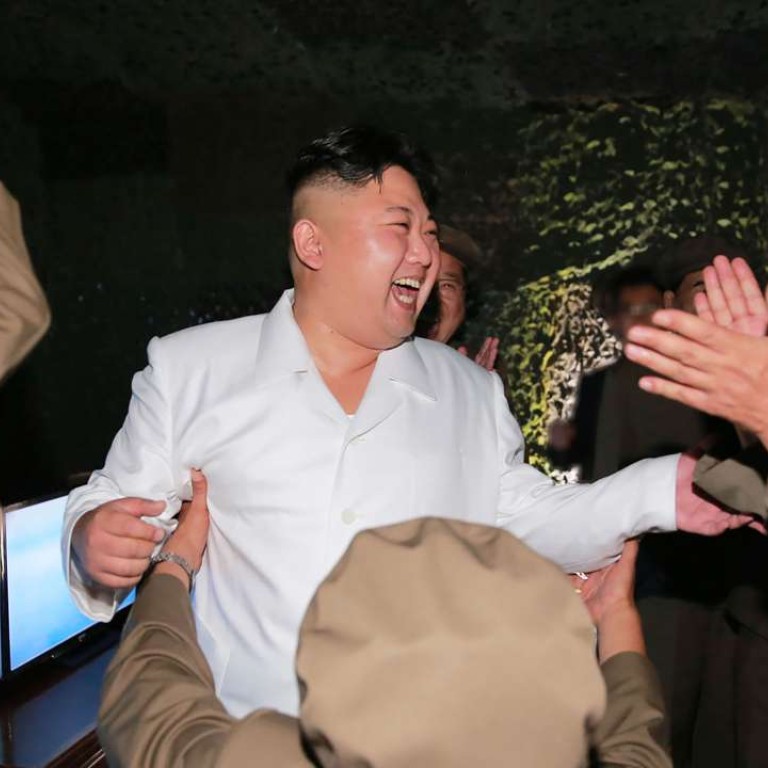
China must rein in Pyongyang’s nuclear actions before it’s too late
Deng Yuwen and Huang Ting say Beijing can no longer be in two minds over its long-time ally’s atomic ambitions, as the strategic and security fallout could be immense
North Korea’s fifth and biggest nuclear test shocked the world, as it is now believed that Pyongyang has made significant technological breakthroughs.
The blast was full of symbolism, taking place on the 68th anniversary of the country’s founding and soon after the G20 Hangzhou ( 杭州 ) summit. It delivers a message that Pyongyang is committed to nuclear weapons and will not abandon its programme even with outside pressure.
For China, the test not only further worsens the geostrategic environment, it lays a more solid moral foundation for the US and South Korea to deploy the Terminal High Altitude Area Defence missile system. Extensive domestic opposition in South Korea to THAAD will also fade as a result.

Has North Korea already prepared for its next nuclear test?
China had a good opportunity to interrupt Pyongyang’s dream of becoming a nuclear state when Kim Jong-un had just come to power and sought help to reinforce his regime. However, it missed that chance and it is now difficult to force Kim to change his stance as he has consolidated his power base. Further, harsh UN sanctions don’t appear to have had any real impact.
The North’s nuclear actions in the past four years have not only led to increased tensions on the Korean peninsula, they have also reduced China’s strategic space. There has been no improvement in China-North Korea relations while South Korea ties have become frosty due to THAAD.
Yet, China still has time and the ability to review its relations with the North and make policy adjustments. Three factors should be taken into account.
Confrontation on the Korean peninsula would make no sense for China
First is the lifespan of the North Korean regime. Is it sustainable, with so many resources used for developing nuclear weapons and maintaining a large army? The regime could carry on for a long time if Pyongyang were to open its door to reform and devote greater efforts to economic development. But, in the current strategic environment, that is an unrealistic scenario.
Second is the potential for confrontation for China and North Korea with the US and South Korea over Beijing’s assistance to Pyongyang because of THAAD. Today, it is no big deal for China to offer economic aid to 20 million North Koreans. But, in the long term, it will become a heavy burden. More importantly, such a conflict between China and the US could manifest into another cold war. Is China prepared and strong enough to fight a global cold war? Also, in such a situation, North Korea is unlikely to hand over its nuclear umbrella and act according to the will of China. Confrontation on the Korean peninsula would make no sense for China.

The reason North Korea’s Kim Jong-un may shrug off new sanctions? China
Thus, it is not hard to see where China-North Korea relations are going. China could unilaterally suspend the Treaty of Friendship, Cooperation and Mutual Assistance as punishment for the fifth nuclear test, warning that it would terminate the treaty if Pyongyang continued down this route. Though the treaty has no real impact, it obligates China to endorse the North. An official announcement on the treaty would put great pressure on Pyongyang as it would show that China could no longer tolerate such action. If Pyongyang kept going its own way, the next step could be to cut off all assistance except humanitarian aid.
Rather than painting Pyongyang into a corner, the intention of sanctions is to bring the regime back to rationality.
Beijing could propose a four-party security cooperation mechanism under which China, the US and South Korea would work together to provide Pyongyang with guarantees in exchange for the permanent freezing of its nuclear weapons. This would also test whether the US and South Korea really have no intention of seeking an overthrow of the Kim regime.
On the Korean nuclear issue, China should not be in two minds any more. The longer it remains unresolved, the more serious will be the harm to China’s interests. There is no need to maintain a formal friendship, as China and its neighbour have long been strange bedfellows who are growing apart. It’s time to take big decisions on North Korea, before it’s too late.
Deng Yuwen is a researcher at the Charhar Institute think tank. Huang Ting is a researcher at the Innovation and Development Institute, Shenzhen

